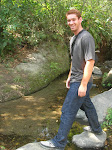Having now lived in both rural communities and an urban setting I enjoy the rural lifestyle as I have found it much safer and more family oriented. I look for opportunities to visit my host family in San Pedro the rural village I lived in while creating the micro-credit program for Mercado Global. Recently an opportunity presented itself when Chema, the oldest sibling of the family asked if I would be present at his high school graduation. You may remember reading from a recent post that Chema’s father died a month ago in a tragic bus accident. Chema explained to me that in Guatemala it is tradition that the parents “receive” the student on stage as he is presented with his diploma. Chema was to be the only student out of 24 graduating seniors that would not have both his parents present. He said that it would be an honor if I would take the place of his father and “receive” him with his mother on stage. I told him that I consider it an honor to be asked. It was a great time to get away from the madness of San Salvador and support my host family as two of the younger siblings were celebrating birthdays in that same week.
After twelve hours on a bus I can spot the lake. At this point in my trip the lake serves as a bolt of motivation that I am minutes away from San Pedro, one of the most pristine places I have every been on earth. However, as my bus began to descend upon San Pedro I noticed a difference in the lake. Its usual blue color was casting a green tint like a sheet of lily pads; however, I had not known frogs to be so apparent around this lake before. In fact, the lake was experiencing an Algae Bloom. A bloom to this degree had never been seen before among these indigenous Guatemalans. Hundreds by the day were traveling to the shores to clean the lake, bucket by bucket. At first I wondered why all these Guatemalan’s did not have to be at work. As I began talking to the people I realized how important the lake is to the economy. Fish had provided many jobs to the natives, and was a traditional food for all three meals consumed during the day. The bloom had also struck tourism. With a dirty lake, many hotels including the broader industries are at peril of survival.

And they are trying to clean in bucket by bucket! Although I am no biology major, I made a quick trip to the Internet café and tried to relay information to the people about the real problem that has been growing at the bottom of the lake for years and years. I told them that it is the chemicals from which they wash their clothes and bath in the lake, the fertilizers that they use on their crops and allow to be washed into the lake, and the trash for which their waste management system is only to wait for the rain to wash it down into the lake. These problems have magnified as an affect of the native lifestyle, and now the bottom of the lake is beginning to roar. I try to explain that a real change of lifestyle is necessary to combat this problem, but how do you get across to a population whose answer to every problem is that “it is in God’s hands.”

As an affect of the lake the natives looked saddened, hungry, and the town carried an obsurd odor among everything else. However, there was a line in the cloud as Chema was graduating, and I was excited to be there for him on this important day. It was a very emotional experience. His Dad was a major influence on him continuing his education, and it was very difficult not having him there. In Guatemala, 50% of children drop out of school before sixth grade! This was a big accomplishment, and it was difficult for Chema to celebrate it without his hero. It was a beautiful ceremony held in the town convention hall, which is about the size of a movie theatre. Traditional Guatemalan graduation music was blowing from the speakers as the students received their diplomas. About half way through the list the power went out! We stood in the dark for about two minutes before it started up again. It forced me to contrast my high school graduation experience. I graduated from a prominent public high school in Washington State, and my graduation was conducted in Seahawk Stadium. My brother, who graduated three years before me, graduated at Safeco Field where the Mariners play baseball. Standing with the power out I could not help but wonder if the power has ever gone out at Seahawk Stadium. I was very proud of Chema, and honored to “receive” him with his diploma. Proud, and perhaps a tad bit out of place, as I was the only foreigner in attendance.
A graduation and two birthdays complete, and more cake and coffee then my body could handle. It was time to return to El Salvador as Computod@s is just beginning to ramp up. I have been very busy in the warehouse/office lately…GOOD BUSY. In my next post I will be sure to update you on the recent progress of Computod@s and where we are headed with the business. Saludos!

